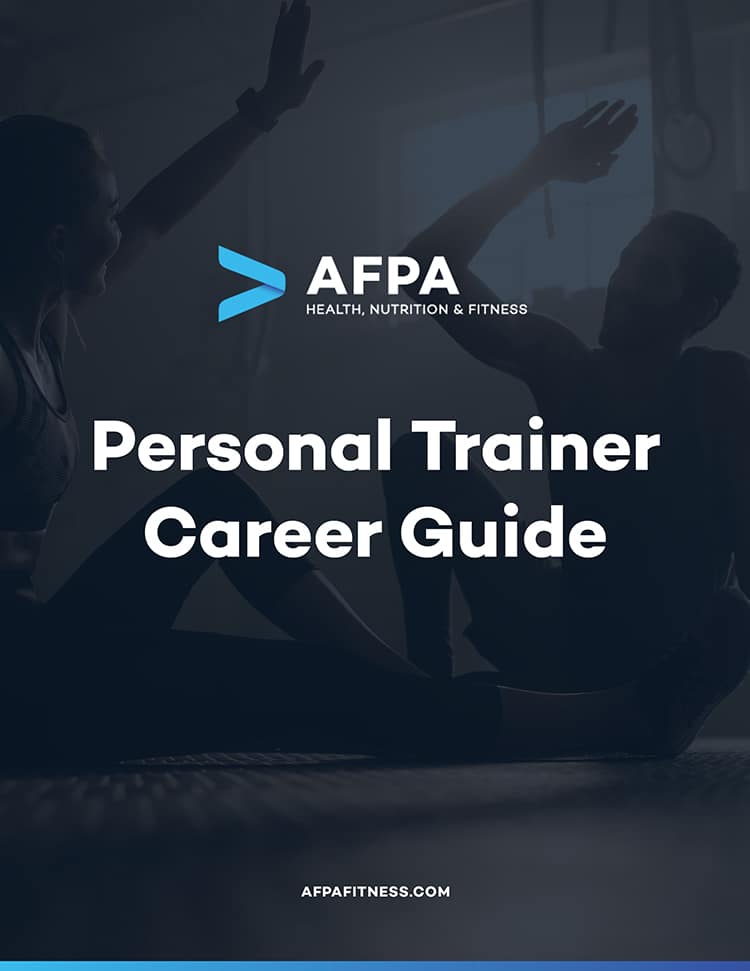You’re passionate about health and fitness, and you’ve made the decision to turn that passion into a career as a personal trainer. Chances are you have a lot of questions: What types of personal trainer certifications are available? Can I specialize? Are they expensive?
Technically speaking, to be a personal trainer, you don’t need any kind of licensing and certification. You can, for all intents and purposes, declare yourself a personal trainer and get started. However, chances are you won’t get hired, build a client list, be able to obtain professional liability insurance, or succeed as a personal trainer. Why? Because when it comes to physical fitness, clients want to know you are qualified and have an accredited personal trainer certification, because they’re putting their health and wellness in your hands!
Learn How to Become a Certified Personal Trainer Online in Less Than 6 Months

With employment levels for fitness trainers expected to grow 10 percent by 2026, you could spend tens of thousands of dollars and take up to four years pursuing a college degree in exercise science, nutrition, physical education, or kinesiology to become a personal trainer. But there are much more affordable options that cost just hundreds of dollars and take months—not years—to complete that will get you into the fitness workforce faster.
Additionally, many personal trainer certification courses are conveniently available online, and the most programs offer financing options, too. For most programs, the only prerequisite—in addition to having a passion for health and fitness, of course—is that you are at least 18 years old.
Here are some of the most common personal trainer certification levels available and the key differences between them:
- Personal Trainer: This certification is the starting point for anyone launching their career as a personal trainer. With a personal trainer certification, you’ll be able to teach your clients how to reach their fitness and health goals. With the median annual salary for a personal trainer in the U.S. at $58,875 (and some salaries as high as $81,690), now is a prime time to enter the health and wellness field as a personal trainer. A certification course should teach you about basic personal training techniques and provide the tools you need to create personal training programs for a variety of populations.
- Advanced Personal Trainer: After obtaining a personal trainer certification, there are usually options for pursuing an advanced certification, which goes more in-depth to help trainers identify, correct, and refine high-level fitness programs for clients. With this advanced program, topics covered typically include in-depth testing protocols, assessment techniques for muscular imbalances, how to develop goal-oriented exercise programs, and more.
- Master Personal Trainer: This certification is the gold standard, and obtaining it can cost several thousand dollars. Why? With this type of certification, you should receive multiple certifications in one. A master personal trainer certification course should cover all levels of personal training, as well as nutrition, wellness, sports conditioning, and more. As a master personal trainer, not only does your earning potential increase greatly, but you’ll also receive the skills, tools, and knowledge to make a huge difference in the health and wellness of your clients.
After you obtain a personal trainer certification, there are countless specialization options you can pursue to further your career. Specializing not only boosts your earning potential, but it also elevates your knowledge and professionalism to help your clients get fit and healthy in the way that is best suited to their needs. Personal trainer specialization certifications vary in cost, but you should expect to spend probably $300-$500 on a specialist certificate.
Here are some of the most common specialist training certifications:
- Strength and Conditioning: This specialist certification should offer an in-depth look at strength training for the upper, lower, and core sections of the body, as well as how to build safe and effective training programs. The best specialist certifications in strength and conditioning should also be based on the latest scientific principles and theories behind resistance training.
- Youth Strength and Conditioning: In order to maximize athletic development and fitness for younger people, this certification should provide the best training advice, exercises, and programs for young individuals. This specialist certification is a great option for personal trainers, coaches, physical education teachers, parents of athletes, and more.
- Senior Fitness: Did you know that the Centers for Disease Control and Prevention (CDC) recommends that adults 65 and older engage in at least 150 minutes of moderate intensity aerobic activity every week? If you’re interested in working with older adults, a specialization geared toward this special population’s needs should guide you in creating programs that are sensitive to the unique needs of seniors. A senior specialization would allow you to work in a variety of fitness facilities, as well as in home gyms and senior living communities.
- Sports Conditioning: With a sports conditioning specialist certification, you’ll be prepared to build sports conditioning programs based on sport-specific performance goals. This type of program should focus on basic fitness principles: power, strength, speed, quickness, coordination, agility, flexibility, local muscular endurance, and cardiovascular aerobic capacity and endurance. This personal trainer specialist certification should give you the chops to build training programs to help your clients reach peak performance and teach you how to use reconditioning regimens to help athletes recover from injuries.
- Youth Fitness: At a time when one in five school-age children suffer from obesity, this specialist certification would help you teach elementary children vital fitness and health skills that could potentially turn their lives around. A youth fitness certification should provide a multidisciplinary approach to health-related fitness to guide you in helping elementary school children develop a love of active, healthy living.
- Functional Training: This specialization is all about acquiring the skills to help clients improve total athleticism and enhance performance in order to perform at the highest level with the lowest risk of injury. This is a great specialist certification for fitness instructors and personal trainers who work with sports enthusiasts and athletes.
- Post-Rehabilitation Fitness: This specialization would provide you with the skills to help develop safe and effective post-rehabilitation programs for clients with specific limitations because of an injury, illness, or disease. With a post-rehabilitation exercise specialization, you would be able to work in a hospital, physical therapy clinic, sports rehabilitation center, or even a senior rehabilitation facility.
Are you ready to jump-start your personal training career? Whether you are new to the health and wellness field or pursuing a specialist certification to complement your current certification, download our 7 Step Guide to Becoming a Personal Trainer now.
Learn How to Become a Certified Personal Trainer Online in Less Than 6 Months




